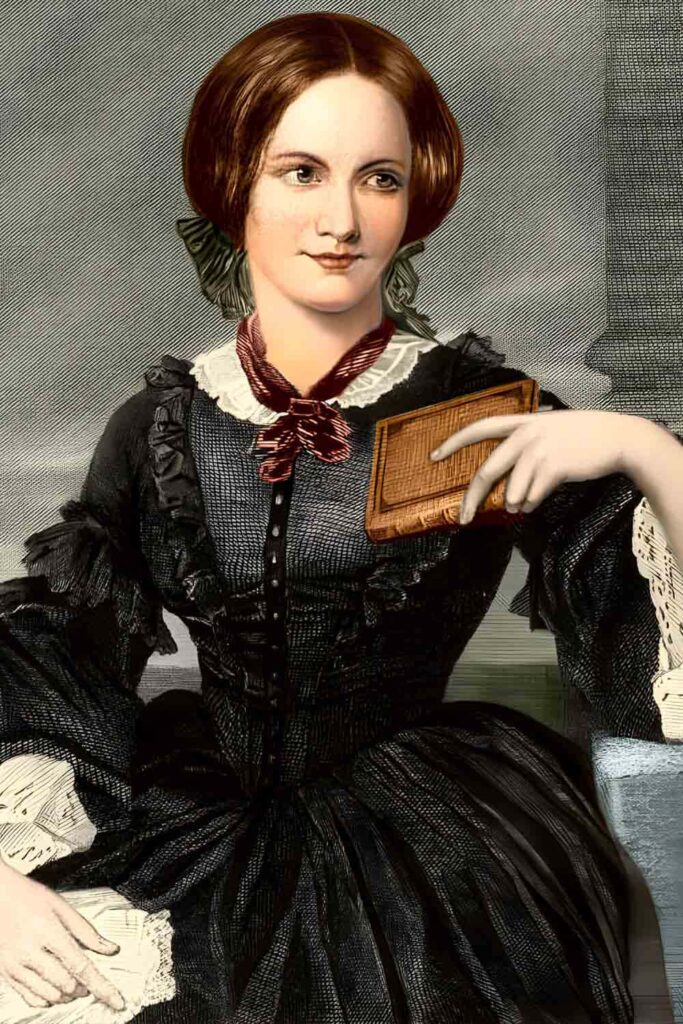
Charlotte Brontë
Bibliography of Charlotte Brontë
Jane Eyre (1847)
Shirley (1849)
Villette (1853)
The Professor (1857), written before Jane Eyre but published posthumously.
Poems
Poems by Currer, Ellis, and Acton Bell (1846)
Other Works
Biographical Notice of Ellis and Action Bell
Richard Coeur de Lion and Blondel
Biography of Charlotte Brontë
Charlotte Brontë, pseudonym Currer Bell, was an English novelist and well-known as the author of Jane Eyre.
Charlotte Brontë was born on April 21, 1816, in Thornton, Yorkshire, England. She was the third of six children born to Patrick Brontë, a clergyman, and his wife, Maria Branwell Brontë. Her siblings were Maria, Elizabeth, Charlotte, Branwell, Emily, and Anne. Her father was appointed as curate of the local church in 1820, and the family moved to Haworth, where Charlotte lived for the rest of her life. Maria Branwell died in 1821, and her sister, Elizabeth Branwell, joined the family in Haworth to look after the children.
In 1824, Maria, Elizabeth, Charlotte, and Emily were sent to the Clergy Daughters’ School at Cowan Bridge, Lancashire, where they suffered from harsh conditions and inadequate food. Charlotte’s two older sisters died of tuberculosis in 1825 due to the school’s poor conditions. Charlotte and Emily were withdrawn and returned home. At home, Charlotte teaches her two younger sisters. The Brontë children also loved writing stories and poems, and she and her siblings would often create entire imaginary worlds. Charlotte and Branwell moved on to create the imaginary world of Angria.
In 1831, Charlotte attended a school at Roe Head, near Mirfield, Yorkshire, where she met her lifelong friends, Mary Taylor and Ellen Nussey. In 1835, Charlotte returned to Roe Head school as a teacher. She stayed there for three years and left Roe Head in 1838. During her time there, Charlotte was unhappy and lonely and drowned herself in poetry. In 1839, she took up various posts as a governess.
Trip to Brussels
Charlotte and Emily Brontë traveled to Brussels in 1842 to enroll in the school run by Constantin Héger and his wife, Claire Zoé Parent Héger. In return for room and board, Charlotte taught English, and Emily taught music. Charlotte and Emily were affected by the passing of their aunt Elizabeth Branwell a few months later, and they had to return to Haworth. In 1843, Charlotte returned alone to Brussels to take the post of a teacher at the boarding school. Throughout her one-year stay in Brussels, she was homesick and deeply attached to Constantin Héger. She left in January 1844 and used the time spent in Brussels for some of the themes in The Professor and Villette.
Back to Haworth
Upon returning home, Charlotte and her sisters tried establishing a boarding school in Haworth, but the response was poor. Then in October 1844, their work at the school ceased.
In 1846, the Brontë sisters published a collection of poems titled Poems by Currer, Ellis, and Acton Bell, under the pseudonyms Currer Bell (Charlotte), Ellis Bell (Emily), and Acton Bell (Anne). The collection was not well received.
The Professor, Jane Eyre, Shirley, and Villette
Charlotte’s first story, The Professor, was rejected by publishers but was eventually published posthumously in 1857. Her first novel, Jane Eyre, was published in 1847 and was an instant success. It is still considered one of the greatest novels of the Victorian era.
In 1848 and 1849, tragedy struck the Brontë family. In September 1848, Branwell Brontë died from severe alcohol consumption, but Charlotte believed his death was due to tuberculosis. Emily Brontë became very sick soon after Branwell’s funeral and died of pulmonary tuberculosis in December 1848. In May 1849, Anne Brontë also succumbed to tuberculosis.
Despite her siblings’ death, Charlotte published her second novel, Shirley, n 1849. It is set during the Napoleonic Wars and is about two women in love with the same man. Charlotte’s third novel, Villette, was published in 1853. It is set in France and is about a young Englishwoman who falls in love with a French man.
In 1854, Charlotte Brontë married her father’s curate, Arthur Bell Nicholls. Charlotte died of pregnancy-related complications in Haworth, Yorkshire, on March 31, 1855. The Brontë Parsonage in Charlotte Brontë’s homeland of Yorkshire is now a museum dedicated to the writer and her family.

